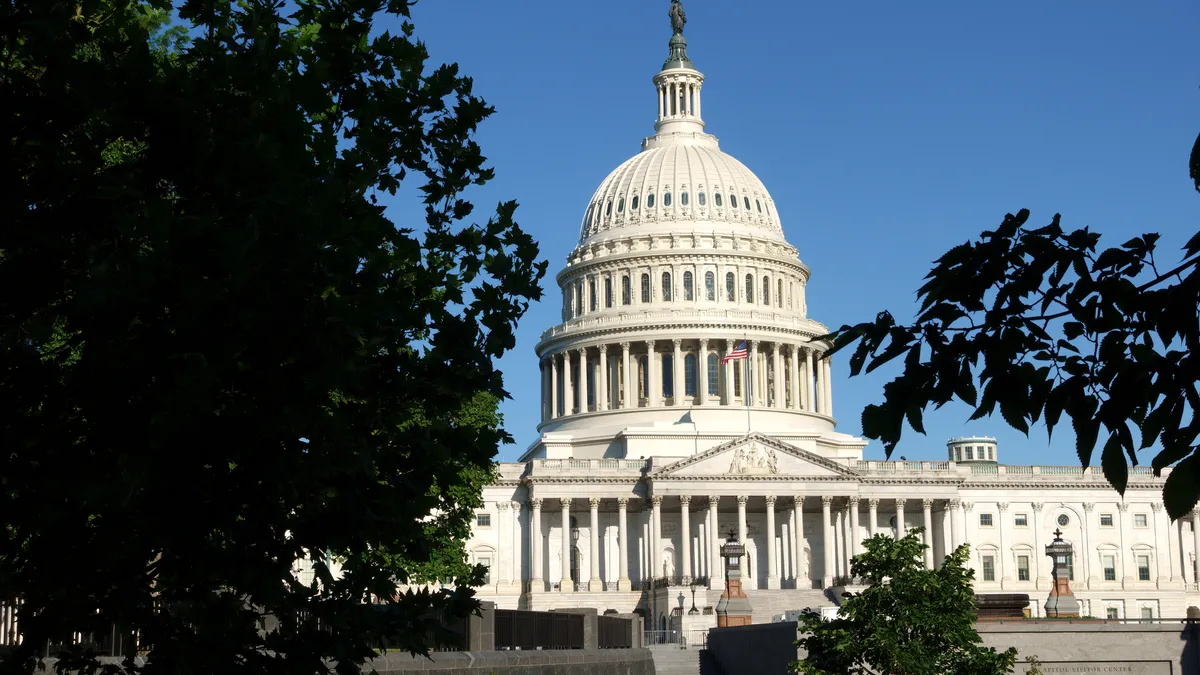Sens. Dick Durbin (D-IL) and Roger Marshall (R-KS) on Wednesday revived their Credit Card Competition Act proposal aimed at spurring more competition in the credit card industry, but this time Republicans planned to take center stage at a Washington press conference to boost the legislation and a companion bill introduced in the House.
The legislation failed to gain traction in the prior congressional session, despite the same bipartisan sponsorship in the Senate. While Durbin has long led the charge to break Visa and Mastercard’s dominance of the industry, the Republican front line for media Wednesday suggests a new approach to how they’re pitching the legislation.
Along with Marshall, Sen. J.D. Vance (R-OH) and Rep. Lance Gooden (R-TX) and Rep. Jeff Van Drew (R-NJ) were scheduled to host the midday press conference alongside merchants and retailers. Durbin couldn’t attend because of a prior commitment, a spokesperson for his office said.
“The bill would direct the Federal Reserve to ensure that giant credit card-issuing banks offer a choice of at least two networks over which an electronic credit transaction may be processed,” the sponsors said in a press release Wednesday.
Payments Dive reported Tuesday that the new bill could land as early as today.
Durbin’s camp made clear earlier this year that he planned to resurrect the legislation. It’s an attempt to build on prior legislation he championed that brought similar changes to the debit industry more than a decade ago. The sponsors have backing from the National Retail Federation, National Association of Convenience Stores, National Grocers Association and National Restaurant Association, among others.
Opponents blasted the legislation Tuesday before the sponsors even announced the new legislative attempt. The Electronic Payments Coalition lined up with the American Bankers Association and National Association of Federally-Insured Credit Unions, among others, to deride the legislation in a press release Tuesday.
“We’re going to do everything in our power to make sure this bill is dead on arrival,” the EPC’s executive director, Aaron Stetter, said in a follow-up interview Wednesday. He argued that the legislation would give big box retailers relief from the fees they pay for a robust credit card system at the expense of financial institutions of all sizes and small business owners that benefit from such payment options.
Supporters of the bill have argued there isn’t enough competition in the market, leading to billions of dollars in additional costs for merchants and consumers. The CCCA would mandate that merchants have access to card networks other than those controlled by Visa and Mastercard for routing credit card transactions. Durbin successfully won passage of an amendment to the 2010 Dodd-Frank Wall Street Reform and Consumer Protection Act that imposed a similar requirement on debit transactions.
“Credit card swipe fees inflate the prices that consumers pay for everyday purchases like groceries and gas,” Durbin said in a press release Wednesday. “It’s time to inject real competition into the credit card network market, which is dominated by the Visa-Mastercard duopoly.”
Reintroduction of the bill will almost certainly reignite the long-running battle between bank card issuers and networks on one side of the fight, and merchants and retailers on the other side. While the card interests say the interchange fees help fund important benefits for consumers, including fraud protection and loyalty programs, the retailers call the cost burden excessive.
Trade groups for the bank card issuers and networks say the CCCA would reduce benefits for consumers, including fraud protection and rewards programs. It would also provide a disincentive for such companies to keep investing in the system, Stetter said in the interview.
Retail and merchant industry groups that have backed the legislation say consumers pay dearly for the interchange fees. Swipe fees were $22 billion higher in 2022 than a year earlier, according to the National Association of Convenience Stores.
“It’s time for big banks and global card networks to compete the same as small businesses do every day,” NRF Chief Administrative Officer and General Counsel Stephanie Martz said in a press release from that trade group.


















